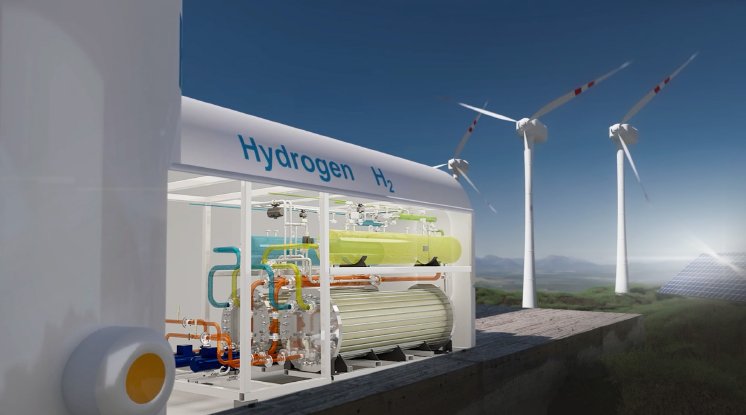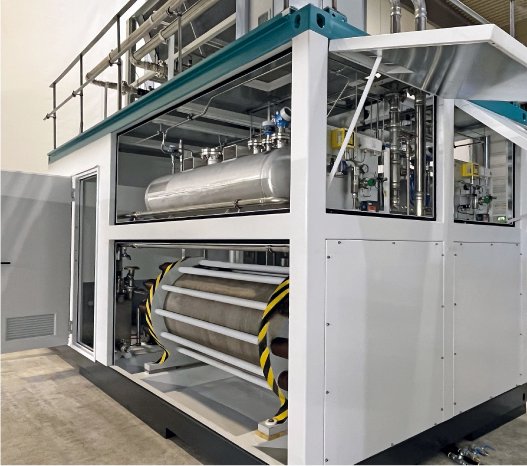After initially building a test bench for testing and validating electrolysis stacks with a diameter of up to 1,500 mm and a maximum output of 500 kW, as well as constructing an electrolysis demonstrator ready for series production, Ecoclean is now is now starting series production of the EcoLyzer systems. The technology behind these compact electrolyzers is based on a system for pressurized alkaline electrolysis that has been developed and optimized by the Center for Solar Energy and Hydrogen Research Baden-Württemberg (ZSW) over the last ten years. One of the advantages of this proven and robust technology is that it does not rely on scarce raw materials such as precious metals or rare earths. Designed as modular units, the electrolyzers can be used to build cost-efficient systems with an output of 1 to 20 MW close to the energy generator (solar, wind, water), which can be easily expanded at a later date. The modular principle not only means that the electrolyzers can be manufactured economically, but also ensures comparatively short delivery times of currently twelve months. The robust and durable systems deliver high gas quality and a system pressure of up to 30 bars as standard. As not every application requires a gas pressure of 30 bars or more, Ecoclean is currently in the process of adding atmospheric-pressure alkaline electrolyzers to its product range. This solution offers cost benefits, particularly when it comes to higher outputs. In addition to the electrolyzer, the company’s portfolio also includes services such as water treatment, gas purification and compression (www.ecolyzer.com) if required.
Scalable solutions for efficient on-site hydrogen production
Whether the hydrogen produced is to be used as raw material for production, substitute for fossil fuels, fuel for CO2 neutral mobility, storage medium for electricity generated from renewable sources or decentralized district solution for electricity generation and heat supply - thanks to their scalability, the robust and low-maintenance electrolyzers can be adapted to the requirements of many different applications. This makes them an ideal solution for industrial and haulage companies as well as for energy suppliers and providers of climate-neutral energy systems.
The EcoLyzers enable energy-intensive branches of industry such as the steel and chemical industries to produce green hydrogen economically, on site, and in the required quantity and quality. This ensures a high security of supply and logistical independence at competitive costs per kilogram of hydrogen.
In the mobility sector - whether on- or off-road, passenger or freight transport - hydrogen produced by alkaline electrolysis and green electricity enables cost-effective decarbonization without the exploitation of raw materials such as precious metals and rare earths. Regardless of whether the vehicle is powered by a fuel cell or combustion engine, fast refueling and long ranges are further advantages that speak in favor of hydrogen and its decentralized production. This makes EcoLyzer solutions particularly interesting for local authorities and haulage companies that want to set up hydrogen filling stations, for example.
The production of electricity from solar radiation and wind rarely coincides with demand. Converting surplus electricity into easily storable hydrogen via electrolysis helps to stabilize the power supply. This is because it can be converted back into electricity using a fuel cell and fed into the grid during dull periods. The efficiency of this process is often unjustly criticized; without hydrogen production, surplus green electricity could not be used at all.
Green hydrogen is also an important building block for supplying electricity and heat to residential districts in a decentralized and climate-neutral manner. The electricity generated by photovoltaics supplies the consumers and the electrolyzer, which converts surplus electricity into hydrogen. If the solar radiation is insufficient, the power supply is ensured by converting the hydrogen back into electricity using a fuel cell. The resulting waste heat can be used to heat buildings via a district heating network. It is also possible to replace a certain proportion of natural gas in gas heating systems with hydrogen. This allows the proportion of climate-neutral energy in buildings to be increased.
Due to the strong expansion of photovoltaics and wind power, producing hydrogen with green electricity will play a much more prominent role in the future. With the EcoLyzer for alkaline electrolysis, Ecoclean offers a proven, globally-available solution that combines reliability and performance with high cost efficiency.
Contact:
Ecoclean GmbH, EcoLyzer Sales, info@ecolyzer.com, www.ecolyzer.com


